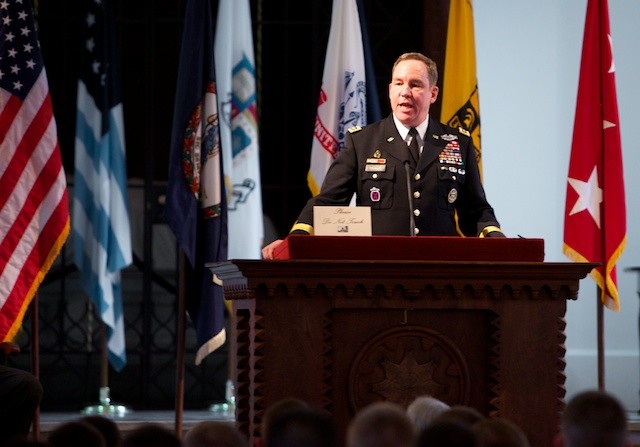LEXINGTON, Va. - The popular saying "there is no better time than the present" imparts immediate relevancy from a new leader's perspective.
At least, that's the message Lt. Gen. Benjamin Freakley, commanding general of the U.S. Army Accessions Command, conveyed during his final address Monday to George C. Marshall Award winners.
With 36 years serving in the Army uniform, and five sons (two of whom are commissioned Army officers), three daughter-in-laws and five grandchildren under age 3 months, Freakley retires this summer. He'll pass "the mantle of leadership onto bright, clear, strong leaders filling the ranks."
But to be bright, clear, strong leaders, Freakley emphasized the importance of Cadets remaining focused on their task and staying diligent with tactical, spiritual and physical fitness - especially during any given period of wait time in between training sessions and prior to their first unit assignment.
"For leaders, there is never a break time," he said. "To be a professional leader prepared for combat, you must immerse yourself in tactical knowledge in your branch on the platoon and company levels. Once you get into combat, there is no more time to prepare. Now is the time to know what it is to place the mission first and accomplish the task. Know what it is to take a person's life, or to lose a Soldier in your unit because that is the complex reality you all may soon face."
Fitness, trust and confidence, Freakley said, are among the top pillars of leadership for an Army in transition. Training to standard, he said, is imperative. And leaders who live by the Warrior Ethos of "never leaving a fallen comrade" and allowing the Army values of integrity and personal courage to resonate within are leaders of character.
"A Soldier who is not held to standard will be a fallen comrade," Freakley said. "And you, as leaders, cannot lead a fallen comrade. You've got to be a leader of character and abide by faith in your belief system, faith in family, faith in country and faith in your Soldiers. Live by the Army Values because that is what will hold you in the toughest of moments."
Freakley spoke frankly about what new Army leaders can expect when deployed to a war zone. The United States is the only nation fighting two wars concurrently, he said, and ironically, all other nations depend on the country's ability to do so.
"When we're in combat, we don't always know the outcome," Freakley said. "And sometimes, natural disasters happen in other countries, like Japan, and we're called to assist in humanitarian missions even while fighting current wars. But when duty calls, we answer."
Immediately after Freakley's talk, several Cadets asked him questions. They ranged from knowing the difference between a new platoon leader and a first sergeant, to learning how to build a career and build a family concurrently while still maintaining a healthy balance.
"I admired his passion for the Army," said Cadet Walter Rausch, of Austin Peay State University. "General Freakley was very motivating and brutally honest about real implications that we're going to face as new lieutenants leading Soldiers. Being tactically proficient, physically fit, knowing and caring for your Soldiers - a combination of those elements makes for great leadership, and those are huge takeaway points for us."
One of Freakley's final statements provided immediate relevancy to the Cadets who, in a few weeks, will be commissioned second lieutenants. He told them the Marshall seminar will be one of the last occasions in which they will be recognized for their individual achievements because once they become leaders of Soldiers, they will be a part of a team, ready to serve rather than be served.
"Know your Soldiers, know your equipment and build strong teams," Freakley said. "We are counting on you to step up to the plate and lead in transition because each of you are part of something greater than yourselves. You will have the privilege of fighting to sustain our freedoms, and those of millions yet to be born. The Army is a profession, and you are the experts. The nation depends on you."


Social Sharing